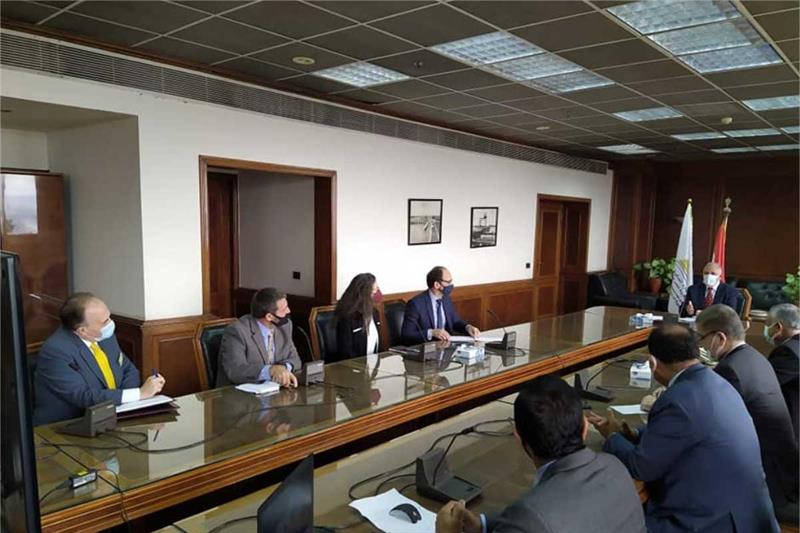Egypt’s Minister of Irrigation and Water Resources Mohamed Abdel-Ati discussed on Saturday with the US deputy ambassador to Cairo and other US officials a planned project to establish a naval route linking Lake Victoria and the Mediterranean through the River Nile, a statement by the ministry said.
Abdel-Ati told Deputy US Ambassador to Cairo Nicole Champagne, US government water expert Matthew Parks, and embassy officials during the meeting that the project will seek to achieve sustainable development for the Nile Basin’s countries.
The Egyptian minister revealed that the project includes a navigation route, a road, a railway, an electric connection, and an information cable to achieve the comprehensive development of the Nile Basin’s countries.
Launched in 2013, the naval linkage project is one of the regional projects sponsored by the New Partnership for Africa’s Development’s (NEPAD) Presidential Infrastructure Development Initiative.
Egypt is leading this project under the patronage of President Abdel-Fatah El-Sisi and the participation of all Nile Basin countries, including Sudan, South Sudan, Uganda, Burundi, Rwanda, the Democratic Republic of the Congo (DRC), Ethiopia, Kenya, and Tanzania.
The project is one of Egypt’s main priorities in Africa in the fields of economic cooperation, river transport, and infrastructure, reflecting Cairo’s desire to strengthen relations with the Nile Basin’s countries.
This is a vital regional project that brings together the countries of the Nile Basin, Abdel-Ati said, considering that river transport between these countries “is one of the best means capable of transferring the movement of trade of various types and sizes at low cost, lower energy consumption, and higher safety rates compared to other means of transport.”
Abdel-Ati moreover highlighted that the project will support the movement of trade and tourism between the participating countries, provide job opportunities, and increase the ability of landlocked countries to reach seas and global ports.
It will also support economic development in the participating countries and strengthen their region’s position in the global economic system as well as support cooperation and integration between the countries in all fields, which is reflected in the project’s vision that is “One Continent – One River – A Common Future,” the minister added.
The US officials expressed interest in the naval linkage project as a promising endeavour that seeks to boost development and improve economic and social conditions of all countries involved.
According to the NEPAD, the project is expected to be accomplished by 2024 while its feasibility studies were launched in 2015.
Legal and institutional studies, which were part of the first phase of feasibility studies, have been ratified in October 2018, according to statements by Egypt’s Minister of Transportation Kamel El-Wazir.
The studies were carried out through a $650,000 grant approved by the African Development Bank in 2015, El-Wazir said in an October roundtable of the project’s donors during the fourth Cairo Water Week.
The roundtable aimed to find financing sources to the second phase of studies at a value of $11.7 million, El-Wazir said at the time, noting that this includes the technical, environmental, and economic aspects of the project.
The GERD, water challenges
During his meeting with the US officials, Minister Abdel-Ati also tackled the latest developments regarding the Grand Ethiopian Renaissance Dam (GERD) file.
Egypt has showed flexibility throughout various stages of negotiations with the aim to reach a fair and binding agreement in regard to the filling and operation of the GERD, the minister said.
He added that the country has made many attempts to build confidence but was not met in “good faith” by the Ethiopian side.
Abdel-Ati said there should be agreed upon procedures for dealing with droughts, given that Egypt mainly depends on the Nile River as a source of water.
He said that any shortfall in water will affect people working in the agricultural sector and cause social problems and instability in the region, a matter that would increase illegal migration rates.
The Ethiopian side deliberately issues incorrect statements and operates the dam unilaterally, a fact that led to great damage to the downstream states of Egypt and Sudan, the minister said.
He added that billions of dollars are needed to mitigate the negative impacts that resulted from these unilateral measures.
Water scarcity and climate change make it more difficult to manage the water issue in Egypt and have left the country particularly sensitive to unilateral measures taken by upstream states, he added.
Furthermore, Abdel-Ati said that the country’s water sector is facing great challenges, specifically the scarcity of water resources and the growth in population in addition to the impact of climate change.
Egypt’s water needs stand at around 114 billion cubic meters per year, however the country has a deficit estimated at about 54 billion cubic meters annually, Abdel-Ati said.
The country has been attempting to close this gap by reusing water and importing agricultural crops equivalent to about 34 billion cubic meters annually, the minister explained.
He added that the ministry is implementing many mega-projects to boost the water system’s capability of dealing with these challenges in a flexible and sufficient manner.
In this regard, he pointed to the country’s efforts to renovate canals, shift to modern irrigation, and establish tertiary water treatment plants with a capacity of 15 million cubic meters per day.
Egypt and Sudan have frequently called for a binding agreement on the filling operation of the GERD to guarantee their water interests, warning that filling the dam without a deal violates the Egyptian and Sudanese peoples’ rights.
Ethiopia completed the second filling of the dam in July despite the two countries’ objections.
A presidential statement issued by the UN Security Council has called for the three countries to re-engage in the African Union-sponsored talks to reach a solution to the dispute.


